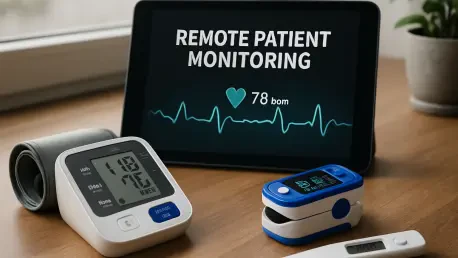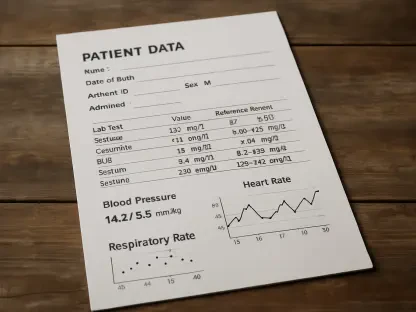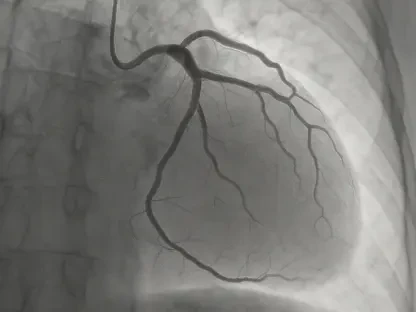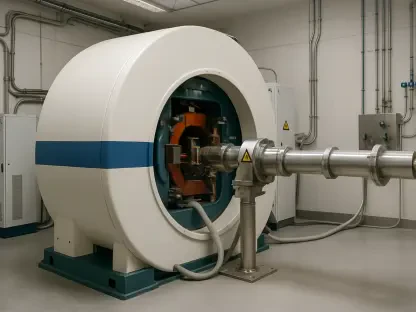In an era where healthcare is undergoing a profound digital transformation, remote patient monitoring (RPM) stands out as a critical innovation, particularly in the realm of clinical trials. HeartcoR Solutions, a prominent core laboratory dedicated to cardiac safety and physiological data analysis, is leading the charge with its recent expansion of RPM devices. This development signals a bold step toward meeting the escalating demand for patient-centric approaches in medical research, ensuring that both trial participants and sponsors benefit from cutting-edge technology.
The announcement, shared through a press release, highlights strategic collaborations with Blue Spark Technologies, Inc. and QT Medical, bringing innovative tools like TempTraq® and PCA 500 into HeartcoR’s portfolio. These devices address diverse monitoring needs, from continuous temperature tracking to detailed cardiac assessments, positioning the company as a comprehensive resource in a competitive field. Beyond individual tools, HeartcoR’s vision to serve as a centralized provider for clinical trial sponsors streamlines complex processes, reducing logistical burdens and enhancing efficiency. As the healthcare landscape shifts toward prioritizing patient comfort and accessibility, HeartcoR’s initiatives align seamlessly with these broader trends, promising to reshape how data is collected and analyzed in clinical studies.
Advancements in Monitoring Technology
Introducing Next-Generation Devices
HeartcoR Solutions has significantly broadened its suite of remote patient monitoring tools by integrating TempTraq® from Blue Spark Technologies and PCA 500 from QT Medical. These additions cater to essential physiological metrics, with TempTraq® offering continuous, real-time body temperature monitoring for up to 72 hours as an FDA-cleared Class II medical device, and PCA 500 providing hospital-quality 12-lead ECG measurements that can be applied at home or on-site. This strategic expansion ensures that clinical trial sponsors have access to a diverse array of monitoring capabilities through a single, reliable partner. By addressing varied needs—from fever detection to cardiac health assessments—HeartcoR is equipping trials with the flexibility to monitor different conditions effectively. The focus on incorporating such specialized tools reflects a deep understanding of the nuanced requirements within clinical research, aiming to enhance both the scope and precision of data collection.
The seamless integration of these devices into HeartcoR’s offerings also underscores a commitment to technological excellence. TempTraq® utilizes Bluetooth connectivity, allowing patients to move freely while data is transmitted in real time, and connects with electronic health records (EHRs) for comprehensive analysis. Meanwhile, PCA 500 simplifies ECG monitoring with a compact recorder, prepositioned electrode strips, and a mobile app linked to a HIPAA-compliant cloud dashboard. These features not only prioritize patient mobility but also ensure that researchers receive accurate, actionable data without delay. This dual emphasis on innovation and usability positions HeartcoR as a leader in delivering tools that bridge the gap between patient experience and research demands, setting a new standard for RPM in clinical settings.
Prioritizing User Experience and Data Integrity
A key aspect of HeartcoR’s device expansion is the focus on user-friendly design, which directly impacts both trial participants and sponsors. Devices like TempTraq® are engineered for simplicity, enabling patients to wear them comfortably for extended periods without disrupting daily routines, while still providing continuous data streams to researchers. Similarly, PCA 500 empowers individuals to perform complex ECG readings without professional assistance, thanks to intuitive components and clear instructions. This accessibility reduces the traditional barriers associated with clinical monitoring, such as frequent clinic visits or cumbersome equipment, making participation more appealing to a broader demographic. By lowering these hurdles, HeartcoR enhances the likelihood of sustained engagement in trials, which is crucial for gathering longitudinal data.
Beyond ease of use, the integrity and quality of data collected through these devices remain paramount. The integration with EHRs and cloud-based platforms ensures that information is not only captured in real time but also stored securely for detailed analysis. This capability allows researchers to detect trends or anomalies swiftly, improving the responsiveness of clinical interventions. Furthermore, the precision of tools like PCA 500, which replicates hospital-grade diagnostics, guarantees that the data meets rigorous scientific standards. HeartcoR’s emphasis on balancing user experience with robust data collection demonstrates a holistic approach to RPM, ensuring that advancements benefit all stakeholders in the clinical trial ecosystem by fostering reliability and trust in the results.
Market Dynamics and Industry Alignment
Adapting to a Patient-Focused Healthcare Model
HeartcoR Solutions’ expansion of its RPM offerings is a direct response to the healthcare industry’s growing emphasis on patient-centric models. As clinical trials increasingly prioritize accessibility and convenience, the ability to monitor health metrics from home has become a vital component of research design. HeartcoR’s devices enable participants to contribute valuable data without the need for frequent in-person visits, which can be a significant deterrent for many. This shift not only improves the overall experience for trial subjects but also helps sponsors reach more diverse populations, including those in remote or underserved areas. By aligning with this trend, HeartcoR is helping to redefine how clinical research accommodates the needs and lifestyles of participants, potentially leading to more inclusive and representative study outcomes.
Additionally, this patient-focused approach addresses practical challenges faced by modern clinical trials. Reducing the physical and logistical burdens on participants can significantly boost enrollment and retention rates, which are often critical pain points in research. With tools that allow for at-home monitoring, HeartcoR ensures that patients remain engaged without sacrificing their daily routines, thereby minimizing dropout rates. This strategy also supports the collection of real-world data, as measurements are taken in natural environments rather than controlled clinical settings. Such data offers unique insights into how treatments perform under typical conditions, providing sponsors with a richer, more nuanced understanding of efficacy and safety profiles.
Seizing Opportunities in a Growing Market
The remote patient monitoring market is experiencing remarkable growth, with projections indicating a compound annual growth rate (CAGR) of 19.8% from 2025 to 2033. HeartcoR Solutions is strategically positioned to capitalize on this upward trajectory by expanding its device portfolio at a pivotal moment. As new technologies and consumer-grade tools continue to emerge, ranging from wearable patches to advanced medical devices, the demand for integrated, reliable solutions in clinical trials is surging. HeartcoR’s proactive approach ensures that it remains competitive in a landscape where innovation is constant, offering sponsors access to the latest advancements without the complexity of navigating multiple vendors. This foresight not only strengthens its market presence but also anticipates the evolving needs of the industry over the coming decade.
Moreover, the rapid expansion of the RPM sector reflects broader digital transformation trends in healthcare, where technology is increasingly leveraged to improve outcomes and efficiency. HeartcoR’s focus on incorporating devices with cutting-edge features, such as real-time data transmission and cloud integration, aligns with this shift toward digital health solutions. By staying ahead of the curve, the company is well-prepared to address future demands, whether they involve scaling up for larger trials or adapting to new regulatory standards. This adaptability is crucial in a field where technological advancements often outpace traditional frameworks, and HeartcoR’s commitment to growth positions it as a key player in shaping how remote monitoring evolves within clinical research contexts.
Transforming Clinical Trial Operations
Simplifying Logistics for Trial Sponsors
HeartcoR Solutions is redefining the operational landscape for clinical trial sponsors by positioning itself as a one-stop shop for remote patient monitoring needs. Historically, sponsors have faced significant inefficiencies when sourcing devices from multiple vendors, often juggling disparate systems, timelines, and support structures. HeartcoR’s consolidated approach eliminates these hurdles by offering a comprehensive suite of tools under a single umbrella, streamlining procurement and management processes. This centralization saves valuable time, allowing research teams to focus on core scientific objectives rather than logistical coordination. Additionally, the potential cost reductions associated with fewer vendor interactions can make trials more financially viable, especially for organizations with constrained budgets.
The impact of this streamlined model extends beyond mere convenience to influence the overall pace of clinical research. With HeartcoR handling the complexities of device integration and support, sponsors can accelerate trial timelines, bringing treatments to market more swiftly. This efficiency is particularly critical in competitive therapeutic areas where speed can determine market advantage. Furthermore, a unified provider like HeartcoR ensures consistency in device performance and data standards, reducing the risk of discrepancies that can arise from working with multiple sources. By addressing these operational pain points, HeartcoR is fostering an environment where sponsors can prioritize innovation and patient outcomes over administrative burdens.
Enhancing Data Collection Through Accessibility
One of the most transformative aspects of HeartcoR’s RPM expansion is its potential to improve data quality through enhanced accessibility for trial participants. Devices designed for ease of use, such as TempTraq® and PCA 500, lower the barriers to participation by enabling patients to monitor their health from the comfort of home. This convenience can lead to higher engagement levels, as individuals are less likely to feel overwhelmed by the demands of traditional clinical settings. Greater participation translates to more robust datasets, which are essential for drawing reliable conclusions about a treatment’s safety and effectiveness. HeartcoR’s focus on accessibility thus directly contributes to the scientific integrity of trials.
Equally important is the diversity of data that accessible monitoring can yield. By making participation feasible for individuals in varied geographic and socioeconomic contexts, HeartcoR helps sponsors capture a wider range of demographic information. This inclusivity is vital for ensuring that trial results are generalizable across populations, addressing a long-standing critique of clinical research as often skewed toward specific groups. Moreover, the real-time nature of data collection through these devices allows for immediate detection of adverse events or trends, enhancing patient safety during trials. HeartcoR’s commitment to leveraging accessibility as a means of enriching data underscores its role in advancing the quality and equity of medical research.
Strategic Collaborations and Long-Term Vision
Building Innovation Through Partnerships
HeartcoR Solutions’ ability to innovate within the remote patient monitoring space is deeply rooted in its strategic partnerships with Blue Spark Technologies and QT Medical. These collaborations have introduced advanced tools like TempTraq® and PCA 500 into HeartcoR’s offerings, combining expertise in device development with clinical research applications. Such alliances are essential in a field where technological progress is rapid, ensuring that HeartcoR remains at the forefront of RPM advancements. By tapping into the specialized knowledge of its partners, the company can deliver solutions that are not only cutting-edge but also tailored to the unique demands of clinical trials, from patient usability to data precision.
These partnerships also reflect a broader industry trend toward collaborative innovation, where combining strengths leads to more impactful outcomes. Working with established technology providers allows HeartcoR to scale its capabilities without the delays associated with in-house development, accelerating the rollout of new tools to sponsors. Additionally, these relationships foster a culture of continuous improvement, as feedback from trial implementations can inform future iterations of devices. HeartcoR’s reliance on strategic alliances highlights a pragmatic approach to staying competitive, ensuring that its portfolio evolves in tandem with emerging challenges and opportunities in the healthcare research sector.
Envisioning a Streamlined Future
HeartcoR’s long-term vision, as articulated by CEO Ciaran Cooper, centers on empowering clinical trial sponsors with streamlined workflows and efficient solutions. The goal of becoming a one-stop shop for RPM devices addresses a critical need for simplicity in an often fragmented industry, where managing multiple partnerships can drain resources. This forward-thinking strategy not only tackles current logistical challenges but also anticipates future complexities as clinical trials grow in scope and diversity. By centralizing access to a wide range of monitoring tools, HeartcoR aims to create a seamless experience that enhances sponsor confidence and operational success.
Looking further ahead, HeartcoR’s emphasis on digital integration points to a future where technology drives every facet of clinical research. The incorporation of real-time analytics and compatibility with EHRs suggests a trajectory toward more data-driven decision-making, where insights are available at the touch of a button. This vision aligns with the industry’s push for interoperability, ensuring that data flows effortlessly between systems to inform trial adjustments and improve patient safety. HeartcoR’s proactive stance in building a cohesive, tech-forward ecosystem positions it as a trailblazer, ready to navigate the evolving demands of a digital health landscape with clarity and purpose.
Prospects for Remote Monitoring in Research
Pioneering a Digital Shift in Trials
HeartcoR Solutions has already demonstrated a profound impact on clinical trials through its expanded remote patient monitoring offerings, reflecting a commitment to pioneering digital solutions. In past efforts, the integration of devices like TempTraq® and PCA 500 proved instrumental in enhancing patient convenience while maintaining high data standards. These tools allowed trials to adapt to participant needs, reducing dropout rates and ensuring consistent data streams. The emphasis on real-time analytics and cloud integration also enabled sponsors to respond swiftly to emerging issues, setting a benchmark for efficiency. HeartcoR’s early adoption of such technologies showcased how digital tools could transform the research process, making it more agile and responsive.
Reflecting on these achievements, it’s clear that HeartcoR played a pivotal role in normalizing at-home monitoring within clinical settings. Previous implementations highlighted the value of accessibility, as participants engaged more readily with user-friendly devices, leading to richer datasets. The partnerships with Blue Spark Technologies and QT Medical were critical in delivering innovations that balanced usability with precision, addressing both sponsor and patient priorities. This foundation of success in streamlining operations and prioritizing participant experience established HeartcoR as a trusted leader, paving the way for broader acceptance of RPM as a cornerstone of modern trials.
Charting the Path Ahead
Moving forward, the focus should shift to scaling these innovations to meet the demands of increasingly complex clinical studies. Sponsors are encouraged to leverage HeartcoR’s comprehensive suite to simplify trial design, ensuring that logistical challenges do not hinder scientific progress. Exploring how real-time data can further enhance safety protocols offers a promising avenue, as immediate insights could prevent adverse outcomes before they escalate. Additionally, integrating emerging technologies, such as artificial intelligence for predictive analytics, could amplify the value of RPM data, providing deeper understanding of treatment impacts.
Another critical step lies in fostering greater collaboration across the industry to standardize RPM practices. HeartcoR can lead initiatives to establish best practices for device integration and data security, ensuring consistency as adoption grows. Engaging with regulatory bodies to anticipate future guidelines will also be essential, as compliance remains a cornerstone of credible research. By championing these efforts, HeartcoR can help shape a future where remote monitoring not only supports clinical trials but also drives broader healthcare advancements, ultimately benefiting patients worldwide with faster, safer access to new therapies.









